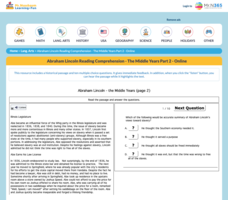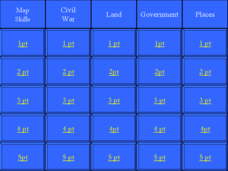Core Knowledge Foundation
The U.S. Civil War Tell It Again!™ Read-Aloud Anthology
Over three weeks, second graders listen to stories about the United States Civil War. Informational texts explore the war, slavery, Harriet Tubman, Abraham Lincoln, Robert E. Lee, Clara Barton, the Emancipation Proclamation, and Ulysses...
Core Knowledge Foundation
The Civil War
A unit covers many aspects of the Civil War. Over six weeks, fifth graders delve deep into the history of slavery, the Civil War—before, during, and after—Abraham Lincoln, women's contributions, the Emancipation Proclamation, and...
Core Knowledge Foundation
The Civil War
A 48-page Student Reader focuses on the Civil War. Scholars gain information from a text that explores when, why, and where the Civil War occurred, as well as important people such as Harriet Beecher Stowe, Harriet Tubman, Abraham...
Core Knowledge Foundation
The Civil War
A unit focuses on the Civil War. Second graders follow along with an informational reading about the war—why it started, how it ended, and essential individuals such as Harriet Beecher Stow, Harriet Tubman, Abraham Lincoln, Ulisses, S....
C3 Teachers
Uncle Tom’s Cabin: Can Words Lead to War?
"Words, words, words." Despite Hamlet's opinion, words can be significant. In this inquiry lesson, middle schoolers learn how the words in Harriet Beecher Stowe's Uncle Tom's Cabin, in the view of many, lead to the American Civil War. To...
Core Knowledge Foundation
Presidents and American Symbols Tell It Again!™ Read-Aloud Anthology
Scholars look into the country's current president, past presidents, the White House, Washington D.C., and the Declaration of Independence. They identify the flag, the Statue of Liberty, as well as Mount Rushmore and the significance of...
Annenberg Foundation
Slavery and Freedom
How do nineteenth-century texts by African American and Native American writers contribute to the country's ideals of freedom and individuality? Learners explore the topic by watching and discussing a video, reading biographies, writing...
Constitutional Rights Foundation
The Lincoln-Douglas Debates — Springboard to the White House
The Lincoln-Douglas Debates saw two primary political candidates debating seven different times about one of the most important social movements in United States history. Middle and high schoolers read an article that describes the...
Mr. Nussbaum
Abraham Lincoln Reading Comprehension—The Middle Years (Part 2)
Abraham Lincoln's face may only be worth one cent, but the online reading passage and questions about his life are an invaluable resource. Pupils read a passage about Lincoln's experience with the Illinois Legislature, earning his law...
Mr. Nussbaum
Abraham Lincoln Reading Comprehension—The Middle Years (Part 3)
How did Abraham Lincoln begin to change the minds of American citizens? Join him in his quest with a reading passage about Lincoln's experiences as a congressman and public denouncement of slavery. The resource contains reading...
Mr. Nussbaum
Abraham Lincoln Reading Comprehension—The Middle Years (Part 1)
Learn more about Honest Abe with an informative passage that details his life chronologically. As learners read sections of the text, they answer multiple choice questions that draw on their ability to recall details from the passage.
Humanities Texas
Primary Source Worksheet: Grant E. Hamilton, “I Rather Like That Imported Affair”
Political cartoons are primary source documents and learning to read them can be a challenge. Challenge the reading skills of your class with a political cartoon featuring rough and ready, Teddy Roosevelt.
Curated OER
Making the Branches of Government Relevant
A discussion of the three branches of government can be a fascinating experience.
Friends of Fort McHenry
Baltimore – Caught in the Middle
Choosing sides is no easy matter, and this was certainly true for the citizens of Baltimore in the beginning stages of the Civil War. Using video, group analysis of several primary sources, and discussion, this detailed and thorough...
Curated OER
Stage a Debate: A Primer for Teachers (Lincoln-Douglas Debate Format)
For a comprehensive overview of debate styles and formats, look at this resource. It details the Lincoln-Douglas debate format (one-to-one debate with specific, timed rounds of points, cross-examination, and rebuttals). You can also find...
Curated OER
The Civil War: A Nation Divided
Discuss the differences between the North and the South and how those differences led to the Civil War. Middle schoolers examine and analyze a famous speech or writing by President Lincoln in order to better understand the speaker's...
Curated OER
Who Freed the Slaves During the Civil War?
Pose the question to your historians: who really freed the slaves? They critically assess various arguments, using primary sources as evidence. In small groups, scholars jigsaw 5 primary source documents (linked), and fill out an...
Curated OER
Active Viewing: Abraham and Mary Lincoln: A House Divided
Young historians consider the cause and effects of the Emancipation Proclamation. They use handouts, response sheets, and class discussion to build an opinion about the subject after viewing the PBS documentary Abraham and Mary Lincoln:...
Curated OER
Blank Jeopardy
Games are a great way to motivate learners to internalize information.. Using this PowerPoint which is in a Jeopardy format, students can review map skills and facts about the Civil War, famous places, and our government. This is a handy...
Utah Education Network (UEN)
7th Grade Poetry: Ode Poem
Walt Whitman's "Captain, My Captain" and Robert Frost's "The Road Not Taken" provide seventh graders with examples of odes. After reading and discussing these and other examples, young poets craft an ode and respond to the ode of a...
Core Knowledge Foundation
The Civil War
A student reader shares information about the history of slavery, the Civil War, President Abraham Lincoln, women's contributions to the war, the Emancipation Proclamation, and reconstruction.
DocsTeach
Who Were Some of the People Who Worked to End Slavery?
As pupils match information to photographs, a document is revealed—the Joint Resolution Proposing the Thirteenth Amendment. Scholars read about some of the people who worked to end slavery, then list each person and at least one way that...
K20 LEARN
Analyzing Early American Figures: Analyzing History
Who were they? High school freshmen brush up on their research skills by investigating an important person in American history. They select a name, fill out a KWHL chart, and research why their person is important. Scholars then complete...
K20 LEARN
The Power of Poetry: Perspectives in Poetry
What do Abraham Lincoln, Dr. Martin Luther King, Jr., and Amanda Gordon have in common? They all believe in the power of words—the power of words to create change. After analyzing the rhetorical strategies in several poems and speeches,...

























